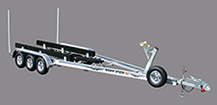
Save on Storage ... Trailer Your Boat
Wet slips prices can be high, but you are paying for the convenience and relative simplicity of having your boat ready when you are. Dry storage is also a good option with the side benefit of some reduced maintenance and cleaning. This option can also put a dent in your wallet. For the budget-conscious, and boaters with a bit of wander lust, trailering might be the best solution.
To find out more about the trailering option, Pilot talked with Art Knighten, one of our favorite boating experts, with some experience with trailers. He says more and more boat owners are keeping their trailered boats at mini-storage warehouses. It’s a convenient, safe and cheap alternative, he says, and it can also help you take care of your boat.
Many subdivisions now won’t let you keep your boat in your driveway, so boat owners have to find a place for their pleasure craft, and mini-storage locations work well. “For boat owners who don’t live on the lake, the mini-storage area is probably closer to the water,” says Knighten. “They can just hop in the car, go pick up the boat and drive to a nearby launch. That way they don’t have to
tow the boat very far.” Virtually all mini-storage businesses have code or key access, so you can come and go any time. Many now feature boat-wash stations to make cleanup easy when you come in off the water. Storing a boat this way has other advantages.
“Especially in a salt-water area, if you leave your boat in the water, you’re going to have a lot more repair problems,” says Knighten. “Keeping it on land prevents corrosion, you won’t have to bottom paint as often, and cleaning will be easier.” If you use your boat only once or twice a month and leave it in the water, you’ll definitely be better off with a trailer, Knighten says. And because you could quickly tow your boat out of harm’s way in the event of a storm, insurance rates are considerably cheaper on trailered boats. Rates vary, but you’ll probably save around 20 percent.
Most storage areas will keep your boat in the sun, but a few have covered storage areas. And of course many boat shops will rent space for boat parking in their yard. That could be convenient in spring if you need the boat worked on before you take it out. But compare prices and be sure you’re not paying far more rent for that once-a-year convenience.
Dry storage marinas that keep your boat on a lift, then put it in the water when you’re ready, offer another alternative, but Knighten says they’re also becoming more expensive, and most can only handle boats of 25 feet or less. You can trailer a 22-to-32-foot boat with a half-ton pickup or SUV. Even a small pickup will do for a craft of about 20 feet. Towing your own boat, of course, requires an upfront investment in a trailer – about $4,000 to $6,000 for a sturdy one, says Knighten. “But if you compare that to dock fees, you can see it won’t take long to start saving money.”
If you’ll be using your boat in salt water, buy a trailer made of aluminum or galvanized steel to resist corrosion. “Aluminum is better, since it will never rust,” says Knighten. “Galvanized material will last a long time, but eventually will rust.” All hardware should be stainless or galvanized steel instead of zinc-plated. Rims should be either aluminum or galvanized.
Be sure you’re within the state’s regulations for brakes on axles. The number of axles on your trailer will depend on the size of the boat. For a boat of 20 feet or less, a single-axle trailer is fine. For a 20-to-27-foot boat, you need a tandem axle, and a boat of 27
feet or more will require a tri-axle. North Carolina law requires brakes on any trailer-boat combination that weighs 4,000 pounds or more, (it’s 3,000 pounds in South Carolina), but Knighten recommends brakes on all axles anyhow. “It saves wear and tear on your car, and it’s safer,” he explains.
For help with all these decisions, find a dealer you can trust for guidance. Check our directory of trailer and hitch dealers in the Marine Service Index. “You can cut corners,” says Knighten, “but if you choose lower-quality materials, brakes or tires, it will end up costing you down the road.”

ABOUT PILOT MEDIA
Copyright © 2018 Pilot Media II LLC

